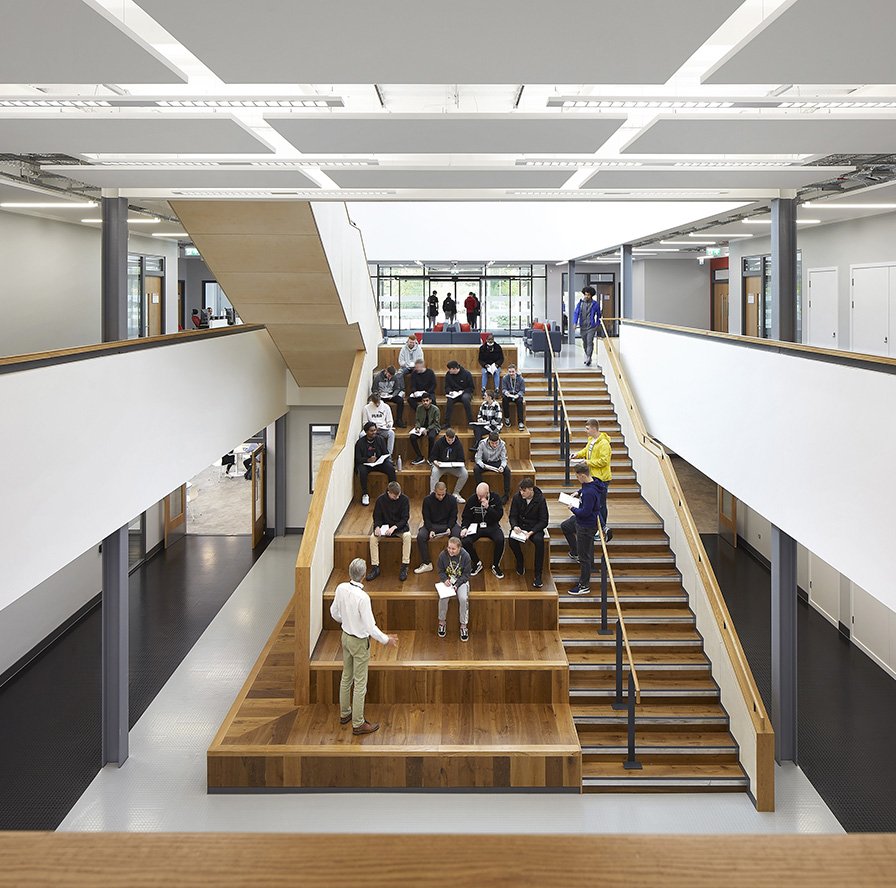Official opening of the Black Country & Marches Institute of Technology
The pioneering Black Country & Marches Institute of Technology (BCIoT) that officially opened in Dudley today, shows how a new way of working can unlock co-design to deliver better, more sustainable buildings at lower cost.
The 4,750sqm BCIoT, which welcomed its first cohort of students in September 2021, received Ministerial seal of approval today with Rt Hon. Michelle Donelan, Minister of State for Higher and Further Education, officially opening the government’s flagship new centre.
Built as one of only 12 IoTs nationally, the £22M project aims to transform the economy of the Black Country through an industry-led collaboration between employers and further education and was developed as part of the government’s £170 million drive to deliver a range of technology institutes across the UK, with £17.36m of funding secured for the institute through the Department for Education programme and a further £2m from the West Midlands Combined Authority.
The BCIoT offers a variety of technical training opportunities including higher level apprenticeships, degree level programmes as well as short courses designed for people in-work; in key sectors focussing on medical engineering and healthcare, advanced engineering and manufacturing, and modern methods of construction.
The BCIoT brings together employers, further education higher education and private training providers to offer higher level technical education, helping close the skills gap in key science, technology, engineering and mathematics (STEM) areas and drive technological innovation in the region. At Dudley, this partnership is made up of a range of employer partners which include The Dudley Group NHS Foundation Trust, Thomas Dudley and the Marches Centre for Manufacturing Technology who alongside Dudley College of Technology are working in partnership with private training providers In-Comm Training and Avensys as well as both the University of Wolverhampton and Worcester.
Commenting on the venture Michelle Donelan Minister of State for Higher and Further Education said: “I’m so pleased to open Black Country & Marches Institute of Technology, which will play a vital role in closing skills gaps in key areas, such as manufacturing, construction and healthcare, in Dudley and the wider region.
“Institutes of Technology represent the height of technical training. By uniquely bringing together further education colleges, universities and businesses, they ensure people can get the skills they need to progress into better paid jobs, and that businesses get the talented workforce they need to thrive.”
Echoing this Neil Thomas, Principal and Chief Executive of Dudley College of Technology, the lead further education provider in the venture, commented: “Developing a technically skilled workforce and providing an even wider range of career pathways for the people of Dudley and the wider region is what this Institute is all about.
“One of the great strengths of the IoT is the degree of collaboration involved. The IoT is bringing together the further and higher education sectors, alongside local employers to shape and design the delivery of courses, in this way we will make sure we provide training that responds to the region’s STEM skills gap.”
Mayor of the West Midlands; Andy Street who had given his backing to the venture through the financial support of the West Midlands Combined Authority was on hand to talk to employers about the opportunities the new Institution would bring for them to upskill staff.
Commenting on the remit of the IoT Andy Street said: “Ensuring residents have the right skills to move into the well-paid jobs of the future is at the heart of my 100,000 jobs plan, and Dudley’s phenomenal new IoT will play a major part in helping to make that happen.
“By focussing on key sectors such as engineering, manufacturing, and healthcare, the IoT will be able to help skill up the region’s workforce to meet the demand of employers. This is exactly why the WMCA were so keen to work with Dudley College and other partners to make it happen.
“Today is a real landmark day for education in the Black Country, and I am absolutely delighted that this key facility is now officially open.”
Following today’s opening numbers at the centre are forecast to grow with 2000 learners set to be taught at the institute by 2025.
The design was developed through collaborative workshops including the main contractor and supply chain from the earliest stages.
The building form was influenced by its function, buildability, site topography and acoustic considerations. In addition, the building takes a passive approach to deliver fresh air and optimal daylight. The ‘T’ shaped plan was devised to create two courtyards shielded from road traffic noise so that windows can be opened for ventilation while maintaining excellent acoustics. Teaching rooms are organised around a central atrium topped with a roof lantern that encourages good air movement and fills the space with daylight.
The design uses the sunken bed of the disused railway line to its benefit; the main entrance is at street level and on the middle floor with easy access to lower and upper level via the atrium staircases. A south facing café is located on the lower level with access to an outdoor terrace in one of the sheltered courtyards. The terrace looks onto a new embankment of wildflowers and native trees that add further sheltering to the courtyard from the adjacent new metro station.
Peter Inglis, a Practice Leader at Cullinan Studio who were architects on the project, said: “We are really pleased with how well the building has been received already by the client and the students. It’s a completely new type of institution on what was a derelict goods yard at the base of the forested hillside below Dudley Castle. The building looks to project a gleaming optimism to its surroundings, with glimpses out to the trees beyond.
At the heart of the building is a timber lined gathering space, flooded with natural light, and surrounded by views into the classrooms, labs and workshops of the college.
The building has a zero fossil fuels, low energy heating and ventilation strategy. The IPI process has helped the whole team deliver a very high quality, very low carbon building on time and within a tight budget, providing exceptional value for money for the client.”
The BCIoT pioneered the Integrated Project Insurance (IPI) model – a new form of insurance that unlocks co-design and makes genuine collaboration possible. IPI broke down traditional barriers, such as conflicting insurance concerns, to allow collaborative problem solving throughout the project, incentivising shared responsibility and a ‘can do’ attitude across the entire team.
Despite the challenging site constraints, including contamination, buried obstructions and an adjacent highway, this collaborative approach meant the project was delivered – during a pandemic - on time and under budget.
The design team worked with the suppliers to design out waste and needless costs from the start. For example, the constructors, Speller Metcalfe, were able to show that a minor adjustment to the IoT’s planned service vehicle access would enable them to use special trucks during the construction process and reduce the need for a permanent crane – saving thousands for the client.
Louise Lado-Byrnes, director at IPInitiatives and Independent Facilitators commented: “By working ‘as one’ rather than as individual entities, and supported by a unique project insurance, this third trial of the model has proven overwhelmingly to reduce project risk, increase profit, create a ‘no blame, no claim’ culture and freedom for decisions to be made on a best for project basis, rather than best for the individuals involved.”
The collaborative IPI model opens real opportunities to design sustainability and carbon reduction into the whole building and construction process. The team worked together to develop a zero fossil fuel heating strategy; to design an envelope optimised to reduce heat loss and reduce overheating; and to minimise use of concrete within the building structure.
Rather than taking a one-size-fits-all approach to sustainability, the IPI approach has allowed the sustainability consultants and wider design team to work closely to develop a bespoke sustainability framework tailored to the project which places performance outcomes at its core.
The resulting building is lean, with every space and constructional system optimised.
Cullinan Studio were architects on the project, working in collaboration with a team facilitated by IPInitiatives, including Speller Metcalfe, Derry Building Services, Fulcro Engineering Services, Cundall and GCA Consulting.



